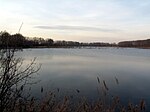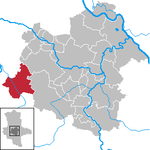Neu Königsaue
AscherslebenFormer municipalities in Saxony-AnhaltSalzlandkreis geography stubs
Neu Königsaue is a village and a former municipality in the district of Salzlandkreis, in Saxony-Anhalt, Germany. Since 1 January 2009, it is part of the town Aschersleben.
Excerpt from the Wikipedia article Neu Königsaue (License: CC BY-SA 3.0, Authors).Neu Königsaue
L 73, Seeland
Geographical coordinates (GPS) Address Nearby Places Show on map
Geographical coordinates (GPS)
| Latitude | Longitude |
|---|---|
| N 51.831944444444 ° | E 11.401666666667 ° |
Address
L 73
06449 Seeland (Neu Königsaue)
Saxony-Anhalt, Germany
Open on Google Maps







